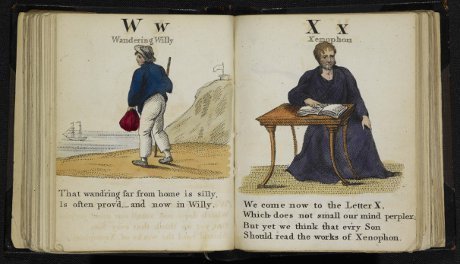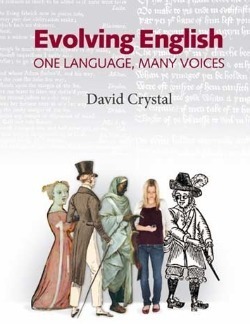XXXXX for Evolving English at The British Library
 I have now had three separate experiences of the magnificent British Library exhibition, Evolving English, which tells the story of our language from the Undley Bracteate to the Tok Pisin.
I have now had three separate experiences of the magnificent British Library exhibition, Evolving English, which tells the story of our language from the Undley Bracteate to the Tok Pisin.
The first was for what we call at the TLS 'the topical', the short piece with accompanying picture which we publish on Page Three each week, sometimes marking an event in the news, more often a cultural event which we think our readers would like to know more about.
On November 5th I chose a selection from The Paragon of Alphabets (1815) in which S stood for Sorrowful Simon, T for Timid Tabitha, W for Wandering Willy and X for Xenophon.
The choice for X, I thought, was something of a surprise.
I could see that by the time a diligent schoolboy reached the end of his nineteenth century alphabet book he might be desperate to Wander from his home and classroom for a while. So an admonition to avoid the fate of Willy would have been well placed.
But the next entry, we mused, could surely have risked confusion, since X is for Xenophon, the Greek writer justly famed for imprudent Wanderings (401–339 BC), in the failed cause of putting a new king on a middle eastern throne.
The author of the Anabasis, while not exactly a 'silly' Willy, was certainly a chancer, an uncertain role model unless maybe the text-book writer was thinking about Xenophon's other famous tome, the so-called Cyropaedia, on how best to educate a benevolent despot.
 Last Thursday night I visited the show at its opening. As I could now read in David Crystal's masterly catalogue, X was notoriously perplexing for Alphabet Book writers in the age before the Xylophone or the X-ray. Xenophon would today, he thought, be an unlikely candidate, an absence only partly due to the decline in classical classes for the very young.
Last Thursday night I visited the show at its opening. As I could now read in David Crystal's masterly catalogue, X was notoriously perplexing for Alphabet Book writers in the age before the Xylophone or the X-ray. Xenophon would today, he thought, be an unlikely candidate, an absence only partly due to the decline in classical classes for the very young.
An exhibition opening is an excellent time to meet old friends and discuss the problems faced by universities, museums and libaries in the current era of govenment spending cuts. But I didn't mange to do any justice to the exhibition itself; indeed I felt unreasonably impatient that it was showing its glories too quietly and with insufficient pzazz (where did that word evolve from?).
On my third engagement with Evolving English - today and not too hard since our TLS office is only half a mile away - I finally found why everyone who cares about English should try to come there before it closes on April 3 next year.
It is a triumph of explanation of 1600 English years - aided by David Crystal's catalogue that begins with that Undley Bracteate ('the earliest clear example of several words in Old English' on a gold medalllion, AD 450-480) and ends with Tok Pisin (a 'pidgin talk' recipe for Tamato Sos,1964) and a poem by John Agard (1985) in which a man is unjustly accused 'of asault on de Oxford dictionary'.
Peter Stothard's Blog
- Peter Stothard's profile
- 30 followers



